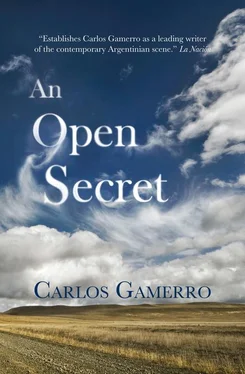“Don’t flatter yourself,” Guido tells me. “Bad-mouthing your neighbour’s an addiction in this town and all they see in you’s an ear. A tender little newborn virgin ear. The tongues start wagging when they see it coming, wriggling around in their mouths like mad. Can’t control themselves. So don’t go thinking they’re doing it to help you or even to ease their consciences. They’re doing it because it’s stronger than they are.”
ON THE CORNER of the telephone exchange — a building clad halfway up in imitation brickwork forming a clumsy tetris against the cement — the orange diving bell of the Entel phone box has been replaced by one of the new rectangular blue ones, but it’s too cold to talk out here, so I go inside and ask for a booth. Paula, my wife, asks me how I am, if I’m having a good time, when I plan on coming back, whether I miss her. Fine, yes, dunno, lots, I reply, and to my two-year-old son, who clamours for the phone with whoops of joy, I say soon, very soon. I hang up with a strange unease in my chest, somewhere between annoyance, hostility, perplexity and guilt, yet none of the above. With every passing day my current life, our shared daily routines, my work, the house we live in, our neighbourhood, the whole of Buenos Aires blurs and dims, and as if in some transfusion of reality, Malihuel grows in specific weight and density, hardening slowly, inexorably, like cement. Maybe there always was a life here for me, a parallel life running from one summer to the next while I was away, like a reflection of my other life — a faint, ghostly reflection, like the ones in shop or bus windows. A life that I might have lived had my mother not left Malihuel so young, and which, after nearly twenty years’ absence, must have faded to almost total transparency, like a vampire without blood; it must have given up all hope, when one day like any other it saw me get off the coach at the new terminal and leapt on me with all the greediness of so long a famine. I know there’s only one person I can share this peculiar uneasiness with and, in pessimistic resignation, dial the number of my friend Gloria. Miraculously she’s at home and delighted as always to hear my voice, asks me how I’m doing, if I’d found out everything I wanted to, who I’d been talking to and if I’d remembered to send her regards. Fine, no, several and yes, I twice told the truth and twice lied to even things out. She put the girls on and, guessing it was me, they fought over the receiver with that peculiar whooping of theirs, and I promised to bring them presents when I got back, counting on the inevitable hamper of Tuttolomondo Pasta that accompanied me in the luggage rack, every summer on my way back to Buenos Aires. The assistant whose open palm receives the shower of coins my call has cost can’t be much over twenty, although her glasses, her tight but dishevelled bun and her shapeless brown pullover add a few more years. Looking more closely I see five earrings studding her left earlobe, and a small blue butterfly tattooed between her thumb and index finger on the other hand. She half-heartedly answers my questions about the old location of the telephone exchange without deigning to make eye contact. Nor has she ever heard of my grandparents, nor predictably enough of the Ezcurras — mother or son. She’s from San Rafael in Mendoza and lives in the Colonia, where her father has been stationmaster since the privatisation of the railways. She doesn’t know and doesn’t want to know about Malihuel’s past, or much about its present either. The whole family dream of being moved on, anywhere, but she’s set a date—“Next year,” she finally looks up at me to say, “I’m twenty-one, and I’m going back to Mendoza if I have to hitch there. If we’d at least been given a house here in town,” she says apologetically. “When it rains a lot like now in winter I sometimes have to get off my bike and carry it with mud up to my ankles ’cause it’s impossible to pedal.” I hang around for as long as I can, waiting in vain for her to match my curiosity and ask something about me, so I ask her another question about her. Soledad, she answers.
“WE NEVER THOUGHT HE’D DO IT, ’specially when he started his enquiries,” Don Casiano Molina, the owner of the Shell franchise, tells me as his employee replenishes the gas I’ve used over the last few days in Leticia’s Fiat Uno. As word of my almost all-consuming interest in the Ezcurra case has spread through the streets of Malihuel like wildfire, I find people increasingly launch into well-rehearsed speeches after I’ve barely opened my mouth. Sometimes they bring up the subject before I even ask. “If Neri’d wanted to, we reasoned, he’d’ve kept the biggest secret and later confronted us with a fait accompli. All that idle chatter threw us off the scent. We all thought his bark was worse than his bite, least I did. I still think Superintendent Neri’s hand was forced by circumstance even now and I still have my doubts about him doing it. If you ask me I reckon Subsuperintendent Greco acted off his own bat and that, faced with the fait accompli, Neri was forced to take the reins so that word wouldn’t get out a subordinate had gone over his head like that. Neri was a different kind of policeman,” rattles the prattling head of Don Casiano, and for the nth time I’m subjected to the irrefutable evidence of the foundations of Neri’s future house, the freshly painted headquarters, the selective honesty with which the Superintendent courted Malihuel’s tradespeople.
“EVERY CLOUD HAS A SILVER LINING,” someone or other said to me in one of the countless conversations. “If the Ezcurra business hadn’t happened we’d never have got Neri off our backs, we’d still have him as mayor, the people would have voted him in, believe you me, aren’t you fed up of hearing about his honesty, his uprightness, his authority, his love for Malihuel? Poor Ezcurra, I know it’s no consolation, but he actually took a weight off our shoulders.”
“I DON’T BOTHER ANYBODY and nobody bothers me,” is all Don Porfirio Dupuy, the spectral landlord of Los Tocayos, has to offer when I ask him one afternoon we’re alone in the bar.
“NO ONE ASKED MY PERMISSION,” says Eduardo Rufus, the owner of La Bonita, the largest slice of the carve-up of the mythical estancia with its own horizon, named La Catalina in honour of my great-grandmother, Señora Kathleen Doyle de Bullock, on his way through Malihuel. He’s agreed to meet me out of deference to Don Brendan Bullock’s memory, for whom his father worked as an administrator. He’s very pleasant to me and insists I’ll be welcome at La Bonita whenever I feel like it. But on the subject of Ezcurra I can’t get anything more out of him than that first phrase. He’s very talkative about everything else though. “Things weren’t that good around here; a lot of land got salt-logged in the floods and to clean it up … We picked up a bit again with the soya but Rosas Paz’s heirs … I always said to them, whoever puts their money in cows loses, but they wouldn’t listen to me and La Bonita just went on growing with the land they kept selling to me. Would you credit it, they wanted to do up the estancia for tourists, it’s all the rage these days you know, they put new rooms in the estancia house and a swimming pool, spent a bomb they did and what for, who’s going to come out here, tourism for spades is all we’ve got, for Benoit’s beach resort. Course they’ll drive brand-new imported four-by-fours in what little land they have left. Me I’d rather stick to my old Rastrojero and have more land to drive around in.”
“POLITICS DIDN’T ENTER INTO IT,” clarifies Clara Benoit, Don León’s daughter, in the half-finished ballroom-cum-bar of the new resort, down by the shores of the lagoon. “It was an excuse. Darío was killed because he was full of life, beautiful and didn’t give a damn. And it was the women who killed him, contrary to popular belief. Not, as rumour has it, the famous seduced and abandoned ones — no woman’s heart, in a body touched by his, could ever again beat against him. They couldn’t even feel jealousy, except maybe towards his mother. No, it was the others that were jealous of him, the ones he’d never touched. They were the ones who finished him off — a conspiracy of jilted hopefuls egging on a flock of imaginary cuckolds” —she breaks off for a minute, exhales smoke from her cigarette and through the broad windows her gaze loses itself in the heaving, leaden expanse of the lagoon, skirted on the horizon by a crooked brushstroke of distant trees. “Darío was the last good thing to happen to this town. That’s why they killed him. In a dead town the living only get in the way.”
Читать дальше












